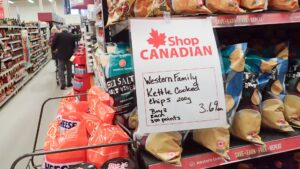The Canadian Consumer Revolution: A Patriotic Response to Trade Tensions
In recent years, the relationship between Canada and the United States has experienced significant strain, sparking a wave of nationalism among Canadians. This sentiment has grown particularly strong in light of the recent trade negotiations and tariffs proposed by the former U.S. administration. Here at Extreme Investor Network, we’re diving deep into this unfolding narrative and its implications on the Canadian economy, consumer behavior, and the broader market landscape.
Image Caption: A "Shop Canadian" sign at the entrance of a Vancouver supermarket, a symbol of growing Canadian nationalism in the face of U.S. tariffs.
A Call to Arms: The Rise of “Shop Canadian”
As tensions rose between the two nations, Canadians responded with an unusual display of patriotism—turning their shopping habits upside down. Amid concerns for their economic sovereignty, many Canadians have begun to actively reject American imports, opting instead for products made right at home. This movement has inspired grocery stores and retailers across the nation to promote domestic goods with signs encouraging customers to "Shop Canadian."
In fact, a recent survey revealed over 60% of Canadians have actively reduced their purchases of American products in both physical and online spaces. The movement has gained traction, with a Facebook group dedicated to buying Canadian-made products more than doubling in membership in just a few months. Canadian consumers are not just standing firm; they are acting with intention, demonstrating a united front that reinforces national identity and community resilience.
The Economic Ripple Effect
As part of this consumer revolt, even large companies and public institutions are taking action. For instance, the Liquor Control Board of Ontario has implemented a ban on American alcohol imports, a move that could significantly impact U.S. spirits manufacturers, potentially costing them hundreds of millions in sales. As Lawson Whiting, CEO of Brown-Forman, aptly noted, “That’s worse than a tariff; it’s literally taking your sales away.”
Additionally, Ontario added a 25% surcharge on electricity exports to neighboring U.S. states, showcasing the broader economic implications of this trade dispute. Although Premier Doug Ford temporarily paused this tax, it highlights how deeply intertwined trade and political sentiments have become.
The Impact on Domestic Markets
With Canadians prioritizing local products, the ripple effect on the economy is significant. The shift toward domestically produced goods could lead to increased investment in local industries, fostering job creation and economic growth. For investors and businesses in Canada, this presents a unique opportunity to align their strategies with this robust surge in national pride—a trend that may be here to stay.
Travel and Tourism: A New Outlook
Travel patterns have also seen a noticeable shift as the friction between the two nations evolves. Data indicates a 23% decline in Canadians returning home by vehicle from the U.S. in February compared to the previous year, suggesting that apprehensions stemming from tariff disputes are influencing travel decisions.
Tourism authorities in regions like New Jersey are keenly aware of this trend, noting that while cancellations have not been as widespread as anticipated, there is a palpable change in sentiment. Canadians are being more selective about their travel plans, evaluating not just the cost but the political climate, especially in light of the fluctuating exchange rate.
A Cultural Shift: More Than Just Economics
The economic impacts are only part of the story. Canadians’ responses to political events have spilled over into cultural spheres—evidenced by acts of defiance at sports events and expressions of national pride in media. High-profile personalities like Mike Myers have used their platforms to rally public sentiment with statements like "Canada is not for sale."
As the political landscape shifts with leadership changes, such as former central banker Mark Carney stepping in as prime minister, Canadian leadership is keenly aware that their domestic policies are now inherently linked to trade relationships and national identity.
Looking Ahead: The Future of U.S.-Canada Relations
As we look to the horizon, the relationship between Canada and the U.S. remains complex and fraught with challenges. However, this growing sense of nationalism among Canadians could create long-lasting changes in consumer behavior and market dynamics. At Extreme Investor Network, we encourage our readers to consider how these shifts affect not just investments but the broader socio-economic fabric of Canada.
Understanding the evolving landscape will be crucial for businesses and investors alike. The surge in “buy local” sentiment may very well reshape market strategies, enhancing the potential for Canadian companies while simultaneously influencing international relationships.
In this new era of economic nationalism, the narrative is one of resilience, unity, and the steadfast commitment of Canadians to support their own. So, whether you’re an investor, entrepreneur, or simply a curious reader, staying informed on these developments will be essential in navigating the ever-changing landscape of North American trade relations.
For more unique insights and expert analysis tailored to the evolving economic climate, stay tuned to our blogs at Extreme Investor Network. Your gateway to understanding and capitalizing on emerging trends starts here!

